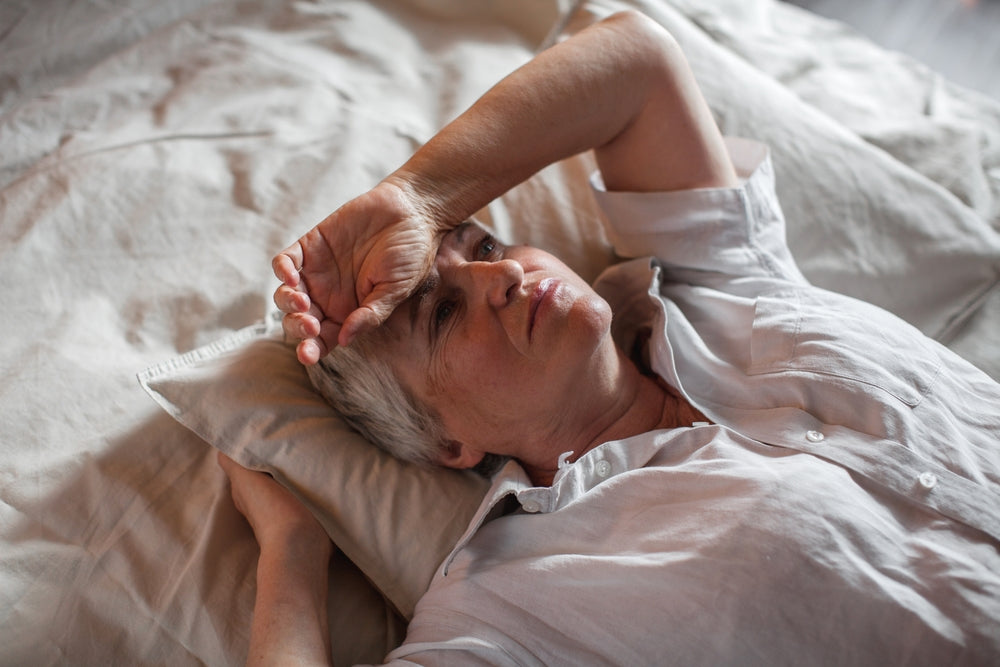Free U.S. Shipping On Orders Over $150

Racing Thoughts Keeping You Awake? How to Sleep When You Are Stressed and Anxious
Posted on
You have a million thoughts racing through your head and the last thing on your mind is sleep. But you know what won’t help with your stress? Not sleeping. If anything, sleep deprivation makes stress and anxiety worse.
Plenty of times I have blown small-ish problems out of proportion all because I was feeling edgy and tired after a night of little sleep.
A good night's sleep lowers stress levels and might even be what you needed to figure out a way out of the fix you are in.
But it can be tough to get some much-needed shut-eye when you can’t stop the racing thoughts. Here are some tips that will help.
How Stress Messes With Your Sleep
Stress makes you more alert. That’s a good thing when you are facing down a bear or walking along a dark deserted street, but it’s not very helpful when you are trying to relax.
Stress triggers the release of ‘alert’ hormones like cortisol and adrenaline that increase your heart rate, blood sugar and blood pressure. This keeps you from relaxing and getting sleepy, partly by suppressing sleep-inducing hormones like melatonin.
We all get stressed on occasion and we stay up longer than we should. But that usually doesn't have any long term harm. You’ll recover the lost sleep easily. But if you are constantly stressed — what’s called chronic stress — then you will be constantly sleep deprived. That can cause serious harm to your health and even lower your lifespan.
5 Tips To Sleep When You Are Stressed or Anxious
1. If You Can’t Sleep, Get Out of Bed
It’s normal to take between 10 and 20 minutes to doze off. Stress can, however, increase your sleep latency to the point where you find you’ve been trying to sleep for an hour.
If it’s been 20 minutes and you are not yet sleepy, the best thing to do is get out of bed. Staying in bed trying to sleep will only make you more anxious, further driving away sleep.
Find something else to occupy your mind, but make sure it’s not something that makes it harder to sleep. So keep your gadget away and don't watch TV or start gaming. These activities might lower your stress but they won’t help you sleep. The last thing you want for your stress is sleep deprivation.
Instead do something like reading, organizing your closet, cooking up a meal or whatever else takes your mind away from your running thoughts. In no time, you will find yourself starting to get sleepy.
2. A Sleep Routine Helps a Lot
If you have chronic stress, a sleep routine is really helpful. It’s also great for people with depression, as we mentioned in our post on sleeping with depression.
A sleep routine puts your mind on autopilot and helps you get the right amount of sleep. Start your routine in the evening when you get home. Have your dinner early and get whatever screen time (TV, phone etc.) you need while bedtime is still some time away.
An hour or two before bed, turn off gadgets and transition into relaxing bedtime activities. This can include time with family, a board game, sex, reading, a warm bath or whatever else helps you relax.
Then go to sleep at the same time everyday and wake up at the same time. Once your body gets into rhythm, your stress-related insomnia will reduce or even go away.
3. Sleep Aids Can Help You Drowse Off
Melatonin supplements don't work for everyone, but some people say it helps them fall asleep faster. Other natural sleep aids you can try include magnesium, valerian root, lavender and glycine.
If you have severe sleep problems because of stress, consult your doctor about using prescription strength sleeping pills.
4. Avoid Anything That Worsens Your Anxiety
Coffee, alcohol, social media, the news, stock market updates, Bitcoin prices….avoid anything that is likely to worsen your stress levels. These triggers will only make it harder to sleep.
More importantly, surround yourself with things that help you relax. For me, it is good music and a mug of herbal tea. What’s yours?
5. Create a Relaxing Sleep Environment
Finally, make sure your bedroom itself is not worsening your stress. Even if it’s not obvious, a cluttered bedroom or one that’s noisy or has an uncomfortable bed can add to your anxiety and make sleep difficult.
Our post on how to turn your bedroom into a sleep sanctuary has lots of great ideas.
Quick links
Contact
6063 Hudson Road #160
Woodbury, MN 55125
Yo@hercLeon.com
Leave a comment: